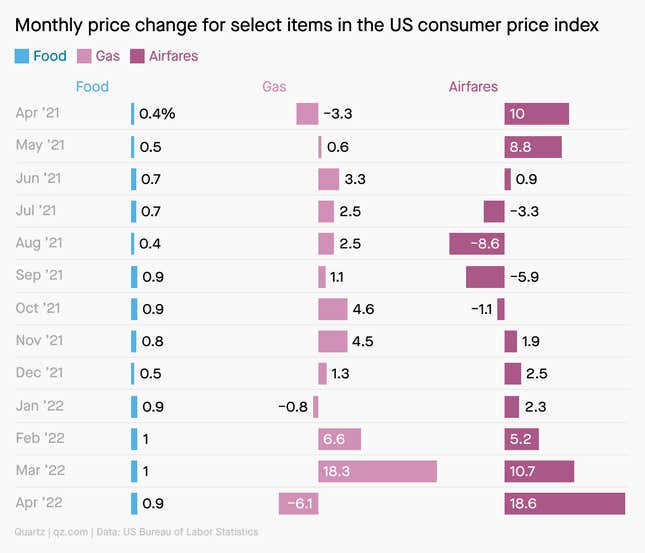Good morning, Quartz readers!
Here’s what you need to know
Hong Kong arrested four opposition activists. All were trustees of the now-defunct 612 Humanitarian Relief Fund, set up by pro-democracy leaders during the 2019 protests.
Oil prices rebounded. Reports of falling covid cases in China and decelerated US price inflation have fueled demand optimism.
Meta added a partner to its Evenstar program. The mobile internet infrastructure aims to lower costs and provide broadband to regions that lack access. Meanwhile, Meta is being sued by contractors in Kenya for labor exploitation and union-busting.
China’s consumer prices rose. The April increase exceeded forecasts, while a lower US price growth rate signals inflation may have peaked (read more below). Inflation in Ghana, however, is skyrocketing.
The EU reached new agreements on carbon market reforms. The policy overhaul comes as energy stakeholders gather in Madrid for the European Gas Regulatory Forum.
Shanghai moved to tighten lockdown measures. Food deliveries and hospital access will be further restricted as Toyota and Tesla announced halts in production.
Cryptocurrency TerraUSD took a tumble. The stablecoin, which is meant to be pegged to the dollar, dropped to a fraction of its original value.
What to watch for

The Ford F-150 Lightning is getting closer. The press was invited to test-drive models of the highly anticipated electric version of the best-selling vehicle in the US, and Ford says it’s ramping up production to release 150,000 trucks by the middle of next year.
CNN: “The Ford F-150 Lightning may be the best pickup truck the company has ever made.”
The Verge: “The buzzards are circling overhead, the road is empty as a moonlit prairie, and all’s right with the world.”
Ars Technica: “This giant battery on wheels can do more than just haul stuff…”
While at first glance, the only thing wrong with this groundbreaking EV is the unfortunate naming of the “frunk”—the storage space under the hood where a combustion engine would normally sit—big, power-hungry cars are still big, power-hungry cars, even if they don’t use gas.
Welcome to the inflation rollercoaster
US consumer prices are still on a gallop, albeit a slower one—inflation was 8.3% in April compared with last year, vs. 8.5% in March. Several wild cards could make for a choppy decline in coming months, from Russia’s Ukraine invasion to avian flu in the US.
What went up and down in April?

What’s causing inflation?
Current inflation shows the lack of US investment in key areas. The US doesn’t need more workers to make chips, but more chip factories. The same goes for rents, which will rise because the US has under-built over the past 20 years.
What can the government do?
The US Fed is hiking interest rates. We already see the effects in higher mortgage rates, which should curb real-estate prices. Meanwhile, president Joe Biden will allow Americans to pump a more polluting, but cheaper kind of gasoline this summer.
Meanwhile, chocolate prices need a push

EU lawmakers are pushing for a plan to raise cocoa prices in west Africa. Before you panic, know that the goal is to improve the lives of workers. Quartz Africa reporter Alexander Onukwue explains.
Handpicked Quartz
Stories our readers are reading this week.
$130: Cost of a four-year degree from a top engineering school in India
$127 billion: Amount non-native species have cost the Indian economy over 60 years
40%: Out-of-stock rate of baby formula in some US states last month
64%: Share of US solar projects imperiled by a US probe into Chinese solar companies
37%: Share of Americans who support a meat tax, despite inflation
4: Number of Avatar sequels planned, with a $1 billion total budget—but does anyone care?
Love stories like these? ✦ Support Quartz journalism by becoming a member today.
Surprising discoveries
The recent exodus from Russia included a celebrity in disguise. Maria Alyokhina of punk band Pussy Riot disguised herself as a food delivery worker.
Choose your words carefully, websites are watching. A large number of the internet’s top websites capture a user’s text input even before the user clicks “submit” on an online form.
Apple TV’s hit show Severance is mirroring reality. A whopping 64% of American workers avoid showing their real selves at work.
One solution to Japan’s steep birthrate decline starts with robotics. Tokyo’s popular Yamanote Line will be the first to test automated trains with passengers aboard.
…While Israel defies all birthrate logic. Taking its education and economy into account, its fertility rate should be closer to that of China and the US, but cultural factors preside. 🎧 In the latest episode of the Quartz Obsession podcast, Hong Kong bureau chief Tripti Lahiri explains the implications of a population’s replacement rate.
🚼 Listen on: Apple Podcasts | Spotify | Google | Stitcher
Our best wishes for a productive day. Send any news, comments, true selves, and carefully worded unsubmitted text to hi@qz.com. Get the most out of Quartz by downloading our iOS app and becoming a member. Today’s Daily Brief was brought to you by Ana Campoy, Adario Strange, Julia Malleck, and Susan Howson.
